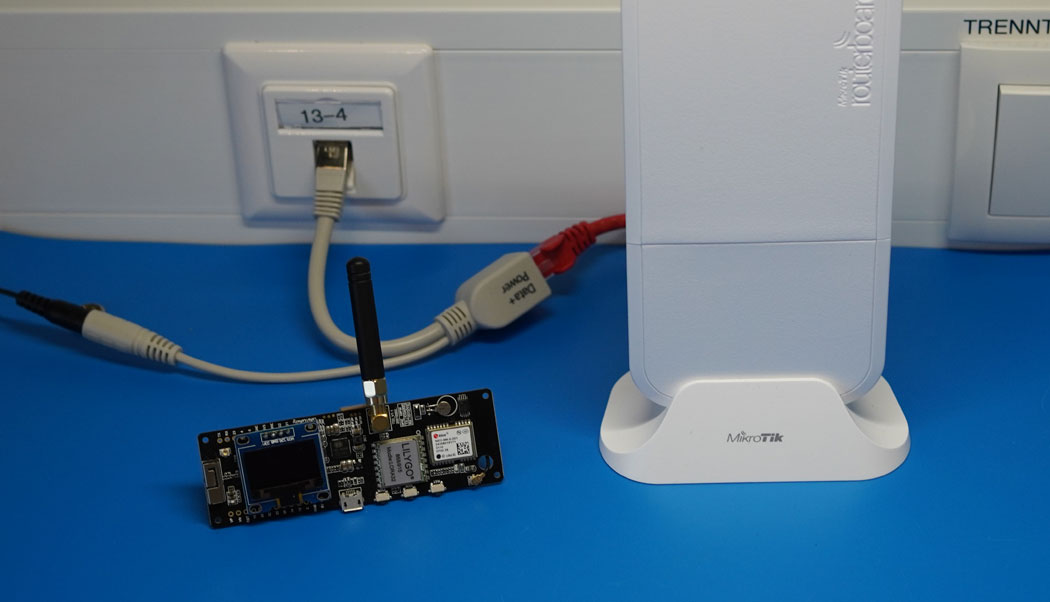Amplifying Analog Voltages with the LM358
05.03.2025
Elektronik | Funk | Software
Der Technik-Blog
On this page you can find the complete sample code for the TTGO LoRaWAN GPS Tracker project. The software includes a function to evaluate the position data sent serially from the GPS module in NMEA 0183 format. Position data is automatically converted to decimal degrees (LAT, LON). ABP is used as activation for the LoRaWAN network.
Note: The pinouts (LoRa, SPI & Serial) are defined for a specific hardware version and may have to be adapted. More information about this in the following or in the main article.
Fields with {FILLMEIN} must be replaced by the respective keys from the LoraWAN network. This project is compatible with TTN (V2) and its successor TTS (V3) and with LoRaWAN V 1.0.3.
Main article: TTGO LoRaWAN GPS Tracker
LoRaWAN GPS Tracker Source Code (OTTA)
Versions used at testing:
-> IDE Version: Arduino 1.8.10Attention: The frequency configuration (868 MHz, EU band) must be checked in the Library-Config or modified if necessary, otherwise no communication a gateway is possible in Europe! Default: 915 MHz!
/*************************************************************************************************** Copyright (c) 2015 Thomas Telkamp and Matthijs Kooijman Permission is hereby granted, free of charge, to anyone obtaining a copy of this document and accompanying files, to do whatever they want with them without any restriction, including, but not limited to, copying, modification and redistribution. NO WARRANTY OF ANY KIND IS PROVIDED. This uses ABP (Activation-by-personalisation), where a DevAddr and Session keys are preconfigured (unlike OTAA, where a DevEUI and application key is configured, while the DevAddr and session keys are assigned/generated in the over-the-air-activation procedure). Note: LoRaWAN per sub-band duty-cycle limitation is enforced (1% in g1, 0.1% in g2), but not the TTN fair usage policy (which is probably violated by this sketch when left running for longer)! To use this sketch, first register your application and device with the things network, to set or generate a DevAddr, NwkSKey and AppSKey. Each device should have their own unique values for these fields. Do not forget to define the radio type correctly in config.h. ------------------------------------------------------------------------------------------------- This sample code has been adapted for LILYGO V1.1 GPS LoRa Board. Further information: https://www.aeq-web.com/ttgo-lilygo-esp32-gps-lora-board-lmic-abp-source-code/ Note: This code example is also compatible with single channel gateways. Currently, only channel 0 is enabled. Further channels can be enabled in the following code below. ***************************************************************************************************/ #include <lmic.h> #include <hal/hal.h> #include <SPI.h> #define SERIAL1_RX 34 // GPS_TX -> 34 #define SERIAL1_TX 12 // 12 -> GPS_RX String read_sentence; uint8_t tx_payload[11]; //Please change the following keys as they are given by TTN // LoRaWAN NwkSKey, network session key static const PROGMEM u1_t NWKSKEY[16] = { FILLMEIN }; // LoRaWAN AppSKey, application session key static const u1_t PROGMEM APPSKEY[16] = { FILLMEIN }; // LoRaWAN end-device address (DevAddr) static const u4_t DEVADDR = 0xFILLMEIN; // <-- Change this address for every node! // These callbacks are only used in over-the-air activation, so they are // left empty here (we cannot leave them out completely unless // DISABLE_JOIN is set in config.h, otherwise the linker will complain). void os_getArtEui (u1_t* buf) { } void os_getDevEui (u1_t* buf) { } void os_getDevKey (u1_t* buf) { } static osjob_t sendjob; // Schedule TX every this many seconds (might become longer due to duty // cycle limitations). const unsigned TX_INTERVAL = 60; //LoRa pin mapping ESP32 (LILYGO Board V1.1) const lmic_pinmap lmic_pins = { .nss = 18, .rxtx = LMIC_UNUSED_PIN, .rst = 23, .dio = {26, 33, 32}, }; void do_send(osjob_t* j) { // Check if there is not a current TX/RX job running if (LMIC.opmode & OP_TXRXPEND) { Serial.println(F("OP_TXRXPEND, not sending")); } else { // Prepare upstream data transmission at the next possible time. Serial.print("Payload: "); int x = 0; while (x < sizeof(tx_payload)) { printHex2(tx_payload[x]); Serial.print(" "); x++; } Serial.println(); LMIC_setTxData2(1, tx_payload, sizeof(tx_payload), 0); Serial.println(F("Packet queued")); } // Next TX is scheduled after TX_COMPLETE event. } void printHex2(unsigned v) { v &= 0xff; if (v < 16) Serial.print('0'); Serial.print(v, HEX); } void setup() { Serial.begin(115200); Serial.println("Starting"); Serial1.begin(9600, SERIAL_8N1, SERIAL1_RX, SERIAL1_TX); //SPI pin mapping ESP32 (LILYGO Board V1.1) SPI.begin(5, 19, 27, 18); #ifdef VCC_ENABLE // For Pinoccio Scout boards pinMode(VCC_ENABLE, OUTPUT); digitalWrite(VCC_ENABLE, HIGH); delay(1000); #endif // LMIC init os_init(); // Reset the MAC state. Session and pending data transfers will be discarded. LMIC_reset(); // Set static session parameters. Instead of dynamically establishing a session // by joining the network, precomputed session parameters are be provided. #ifdef PROGMEM // On AVR, these values are stored in flash and only copied to RAM // once. Copy them to a temporary buffer here, LMIC_setSession will // copy them into a buffer of its own again. uint8_t appskey[sizeof(APPSKEY)]; uint8_t nwkskey[sizeof(NWKSKEY)]; memcpy_P(appskey, APPSKEY, sizeof(APPSKEY)); memcpy_P(nwkskey, NWKSKEY, sizeof(NWKSKEY)); LMIC_setSession (0x1, DEVADDR, nwkskey, appskey); #else // If not running an AVR with PROGMEM, just use the arrays directly LMIC_setSession (0x1, DEVADDR, NWKSKEY, APPSKEY); #endif #if defined(CFG_eu868) // Set up the channels used by the Things Network, which corresponds // to the defaults of most gateways. Without this, only three base // channels from the LoRaWAN specification are used, which certainly // works, so it is good for debugging, but can overload those // frequencies, so be sure to configure the full frequency range of // your network here (unless your network autoconfigures them). // Setting up channels should happen after LMIC_setSession, as that // configures the minimal channel set. // NA-US channels 0-71 are configured automatically LMIC_setupChannel(0, 868100000, DR_RANGE_MAP(DR_SF12, DR_SF7), BAND_CENTI); // g-band LMIC_setupChannel(1, 868300000, DR_RANGE_MAP(DR_SF12, DR_SF7B), BAND_CENTI); // g-band LMIC_setupChannel(2, 868500000, DR_RANGE_MAP(DR_SF12, DR_SF7), BAND_CENTI); // g-band LMIC_setupChannel(3, 867100000, DR_RANGE_MAP(DR_SF12, DR_SF7), BAND_CENTI); // g-band LMIC_setupChannel(4, 867300000, DR_RANGE_MAP(DR_SF12, DR_SF7), BAND_CENTI); // g-band LMIC_setupChannel(5, 867500000, DR_RANGE_MAP(DR_SF12, DR_SF7), BAND_CENTI); // g-band LMIC_setupChannel(6, 867700000, DR_RANGE_MAP(DR_SF12, DR_SF7), BAND_CENTI); // g-band LMIC_setupChannel(7, 867900000, DR_RANGE_MAP(DR_SF12, DR_SF7), BAND_CENTI); // g-band LMIC_setupChannel(8, 868800000, DR_RANGE_MAP(DR_FSK, DR_FSK), BAND_MILLI); // g2-band //LMIC_disableChannel(0); //Send only at channel 0 LMIC_disableChannel(1); LMIC_disableChannel(2); LMIC_disableChannel(3); LMIC_disableChannel(4); LMIC_disableChannel(5); LMIC_disableChannel(6); LMIC_disableChannel(7); LMIC_disableChannel(8); // TTN defines an additional channel at 869.525Mhz using SF9 for class B // devices' ping slots. LMIC does not have an easy way to define set this // frequency and support for class B is spotty and untested, so this // frequency is not configured here. #elif defined(CFG_us915) // NA-US channels 0-71 are configured automatically // but only one group of 8 should (a subband) should be active // TTN recommends the second sub band, 1 in a zero based count. // https://github.com/TheThingsNetwork/gateway-conf/blob/master/US-global_conf.json LMIC_selectSubBand(1); #endif // Disable link check validation LMIC_setLinkCheckMode(0); // TTN uses SF9 for its RX2 window. LMIC.dn2Dr = DR_SF9; // Set data rate and transmit power for uplink (note: txpow seems to be ignored by the library) LMIC_setDrTxpow(DR_SF7, 14); // Start job do_send(&sendjob); } void loop() { os_runloop_once(); read_sentence = Serial1.readStringUntil(13); //13 = return (ASCII) read_sentence.trim(); if (read_sentence.startsWith("$GPGGA")) { String gps_lat = sentence_sep(read_sentence, 2); //Latitude in degrees & minutes String gps_lon = sentence_sep(read_sentence, 4); //Longitude in degrees & minutes String gps_sat = sentence_sep(read_sentence, 7); String gps_hgt = sentence_sep(read_sentence, 9); String gps_lat_o = sentence_sep(read_sentence, 3); //Orientation (N or S) String gps_lon_o = sentence_sep(read_sentence, 5); //Orientation (E or W) /* Serial.print("LAT: "); Serial.print(Latitude); Serial.print(" LON: "); Serial.print(Longitude); Serial.print(" ALT: "); Serial.print(Altitude); Serial.print(" SAT: "); Serial.println(Sat); */ float Latitude = convert_gps_coord(gps_lat.toFloat(), gps_lat_o); float Longitude = convert_gps_coord(gps_lon.toFloat(), gps_lon_o); float Altitude = gps_hgt.toFloat(); int Sat = gps_sat.toInt(); generate_payload(Latitude, Longitude, Altitude, Sat); } } void onEvent (ev_t ev) { Serial.print(os_getTime()); Serial.print(": "); switch (ev) { case EV_SCAN_TIMEOUT: Serial.println(F("EV_SCAN_TIMEOUT")); break; case EV_BEACON_FOUND: Serial.println(F("EV_BEACON_FOUND")); break; case EV_BEACON_MISSED: Serial.println(F("EV_BEACON_MISSED")); break; case EV_BEACON_TRACKED: Serial.println(F("EV_BEACON_TRACKED")); break; case EV_JOINING: Serial.println(F("EV_JOINING")); break; case EV_JOINED: Serial.println(F("EV_JOINED")); break; case EV_RFU1: Serial.println(F("EV_RFU1")); break; case EV_JOIN_FAILED: Serial.println(F("EV_JOIN_FAILED")); break; case EV_REJOIN_FAILED: Serial.println(F("EV_REJOIN_FAILED")); break; case EV_TXCOMPLETE: Serial.println(F("EV_TXCOMPLETE (includes waiting for RX windows)")); if (LMIC.txrxFlags & TXRX_ACK) Serial.println(F("Received ack")); if (LMIC.dataLen) { Serial.println(F("Received ")); Serial.println(LMIC.dataLen); Serial.println(F(" bytes of payload")); } // Schedule next transmission os_setTimedCallback(&sendjob, os_getTime() + sec2osticks(TX_INTERVAL), do_send); break; case EV_LOST_TSYNC: Serial.println(F("EV_LOST_TSYNC")); break; case EV_RESET: Serial.println(F("EV_RESET")); break; case EV_RXCOMPLETE: // data received in ping slot Serial.println(F("EV_RXCOMPLETE")); break; case EV_LINK_DEAD: Serial.println(F("EV_LINK_DEAD")); break; case EV_LINK_ALIVE: Serial.println(F("EV_LINK_ALIVE")); break; default: Serial.println(F("Unknown event")); break; } } String sentence_sep(String input, int index) { int finder = 0; int strIndex[] = { 0, -1 }; int maxIndex = input.length() - 1; for (int i = 0; i <= maxIndex && finder <= index; i++) { if (input.charAt(i) == ',' || i == maxIndex) { finder++; strIndex[0] = strIndex[1] + 1; strIndex[1] = (i == maxIndex) ? i + 1 : i; } } return finder > index ? input.substring(strIndex[0], strIndex[1]) : ""; } float convert_gps_coord(float deg_min, String orientation) { double gps_min = fmod((double)deg_min, 100.0); int gps_deg = deg_min / 100; double dec_deg = gps_deg + ( gps_min / 60 ); if (orientation == "W" || orientation == "S") { dec_deg = 0 - dec_deg; } return dec_deg; } void generate_payload(double lat, double lon, int alt, int sat) { uint32_t LatitudeBinary = ((lat + 90) * 1000000); uint32_t LongitudeBinary = ((lon + 180) * 1000000); uint8_t payload[11]; payload[0] = ( LatitudeBinary >> 24 ) & 0xFF; payload[1] = ( LatitudeBinary >> 16 ) & 0xFF; payload[2] = ( LatitudeBinary >> 8 ) & 0xFF; payload[3] = LatitudeBinary & 0xFF; payload[4] = ( LongitudeBinary >> 24 ) & 0xFF; payload[5] = ( LongitudeBinary >> 16 ) & 0xFF; payload[6] = ( LongitudeBinary >> 8 ) & 0xFF; payload[7] = LongitudeBinary & 0xFF; payload[8] = ( alt >> 8 ) & 0xFF; payload[9] = alt & 0xFF; payload[10] = sat & 0xFF; int i = 0; while (i < sizeof(payload)) { tx_payload[i] = payload[i]; i++; } }

The UDP packet forwarder developed by Semtech handles the data transmission of the received packets from the LoRaWAN gateway to the network server
read more
The LoRaWAN FRM payload includes numerous headers, the encrypted payload, and an integrity code. This article explains the structure of an uplink message
read moreAEQ-WEB © 2015-2026 All Right Reserved